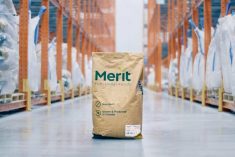Lessons have been learned from the downturn in the plant-based protein marketplace, including what could have been done differently when it came to marketing, product development and consumer expectations.
Attendees heard that message during a panel of industry representatives in the plant-based ingredient space at the recent Agri Tech Venture Forum in Toronto.
“The problem is that there’s a lot of bad products in the market, you know, and I’m a chef by profession,” said Yves Potvin, founder of Konscious Foods, a plant-based protein company. “The first person that’s going to try a plant-based product, if they try (those ones), they’re going to be very disappointed and they might not go back in the marketplace.”
Read Also

Trade uncertainty, tariffs weigh on Canadian beef sector as market access shifts
Manitoba’s beef cattle producers heard more about the growing uncertainty they face as U.S. tariffs, and shifting trade opportunities, reshape their market.
The discussion hit a more positive note looking to the future. There was significant optimism that the market will grow and that companies dishing out products meeting consumers desire will continue to succeed.
More plant-based protein consumption can create more markets or boost prices for farmers’ crops.
The panel was moderated by Bill Greuel, CEO of Protein Industries Canada (PIC), the $350-million federal government fund to increase plant protein production and processing in Canada.
Panellists offered their take on what went wrong when some of those early plant-protein options hit the market amid a wave of hype. Products looking to replace meat directly rather than dig new niches on the menu appealed to vegans and vegetarians, but often didn’t meet expectations on taste or eating fulfillment for the general grocery shopper, attendees heard.
It is expected, however, that plant proteins will grow significantly as an ingredient in food, an avenue that the panellists in attendance hope to cash in on.
PIC has identified a $25 billion opportunity in plant proteins in food ingredients. The ingredients sector is another way to add to additional processing in rural Western Canada, Greuel said in an interview.
The more processing on the Prairies, the less product must be moved to water for shipping, a cost estimated at about $75 per tonne. “More processing in Western Canada means we’re not beholden to the transportation sector for those dollars,” he argued.
He pointed to news of a new Louis Dreyfus pea protein plant in Yorkton, Sask., announced in February. “They see the growth potential at about six to seven per cent compound annual growth rate. That’s significant.”
Heidi Dutton, CEO of Lovingly Made Ingredients and Sunnydale Foods, flagged hybrid foods as the future of plant protein.
She sees people like her father, a Saskatchewan farmer who she described as a “meatetarian,” as part of that customer base. They may be suspicious about plant protein, but will eat products where a plant protein has been added in alongside traditional ingredients, such as in a bolognaise sauce for spaghetti.
The companies she runs provide ingredient consulting for other food companies when they want to simplify their products to be more consumer-friendly. That work covers both the meat and plant protein markets.
Price has been a challenge for plant protein products trying to replace meat, but there should be room to be price competitive. “You can buy peas for $440 Canadian a tonne,” said Dutton. “And you can sell ground beef for $15,000 a tonne. There’s money to be made in between.”
Lei Luc, CEO of Liven, a Canadian company turning plant protein into products like collagen, said the increase in plant-based products will take time. Their section in the supermarket continues to be small.
“What will help the sections expand is … by investing in the sector and enabling different diversity of ingredients to increase the portfolio,” she said.
Consumer evolution takes time, she added, citing the 30 years it took for the rennet used in the majority of cheese-making to shift from that sourced from animal stomachs to bio-based.
Potvin is a serial innovator in plant-protein products. He built and sold Yves’ Veggie Cuisine, Gardein and has now launched Konscious Foods.
He continues to make meat replacements, including a popular smoked salmon replacement, as well as products meant to taste like tuna and crab. Their California roll is also popular and has won awards at American food competitions. They now sell in 6,000 stores in the United States and they can make 4,000 California rolls per hour with their machinery. They’re looking to grow.
He’s not anti-meat or anti-fish, he said, but he is for giving people more food choices, and he feels plant-based food hasn’t had enough winners in the space. “We really need a product that will bring people to the category.”
Products like his smoked salmon replacement have to deliver on price, taste, availability, nutrition and it can make people who are concerned with salmon production feel good about what they’re buying, he said.
It’s a tall order. Companies that remain after the market upheaval for plant products will have to be more focused on markets that matter and products that people are excited to keep eating, Potvin said.















